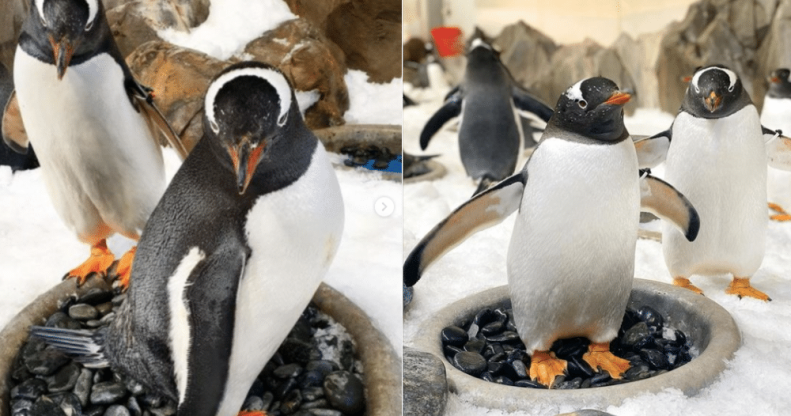Adorable gay penguins cosy up for nesting season at aquarium and maybe love is real after all

Some of the adorable gentoo penguin nesting pairs at Melbourne aquarium (Instagram/@Sealifemelbourneaquarium)
Love is in the air (and the water) at Sea Life Melbourne, where two sets of gay gentoo penguins have coupled up for nesting season.
The aquarium in Australia has announced two same-sex pairs, Tiger and Branston and Jones and Klaus, among its latest gentoo penguin partnerships.
None of them can lay an egg, but that’s not stopping them from being the best damn penguin parents they can be.
“Same-sex penguin pairs will court each other and incubate an egg exactly the same way as a male-female pair,” lead bird keeper Tanith Davis said in a statement to AAP.
“As male-male pairs can’t lay their own eggs, we will sometimes foster an egg to them from another pair. Sea Life Melbourne has had many same-sex couples in our breeding history, and they have been doting parents.”
Penguins are super gay and that’s OK
Same-sex pairings aren’t uncommon in the animal world. Homosexual behaviour has been observed in more than 1,500 animal species, and penguins in particular are notoriously gay.
Several gay penguin power couples have been observed in zoos and aquariums around the world, including the famous Sphen and Magic at Sea Life Aquarium in Sydney.
The two male birds hatched their first chick in 2018 after zookeepers noticed them attempting to hatch a rock and gave them a spare egg to look after.
Having proved themselves responsible parents the inseparable couple are now the aquarium’s go-to adoptive dads for eggs neglected by straight penguins.
Then there’s the lesbian penguins of London’s Sea Life Aquarium, one longtime couple named Marmalade and Chickpea and a new couple called Marama and Rocky.
The latest gentoo gal pals began courting each other in May by bringing pebbles to each other as gifts, which will later be used to build their nests.
“Gentoo penguins are the ultimate romantics, and their dating techniques are truly unique – so much so that as humans, we could certainly learn a thing or two from their passion and commitment to finding a mate,” Sea Life manager Catherine Pritchard told the BBC.

